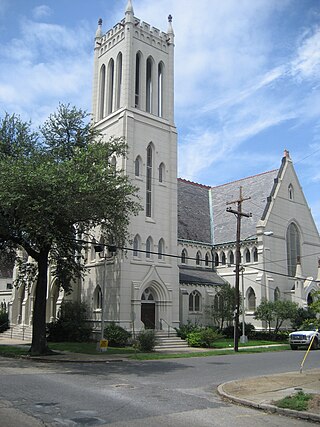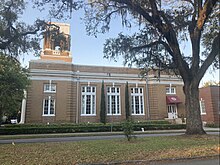
In church governance, a diocese or bishopric is the ecclesiastical district under the jurisdiction of a bishop.

Christ Church Cathedral, located today at 2919 St. Charles Avenue, in New Orleans, Louisiana, in the United States, was the first non-Roman Catholic church founded in the entire Louisiana Purchase territory. It was founded in 1803 as Christ's Church by the Protestant inhabitants of New Orleans, and is today the official seat of the Bishop of Louisiana, in the Episcopal Diocese of Louisiana.

There have not been bishops in the Church of Scotland since the Restoration Episcopacy of the 17th century, although there have occasionally been attempts to reintroduce episcopalianism.

The Episcopal Diocese of Atlanta is the diocese of the Episcopal Church in the United States of America, with jurisdiction over middle and north Georgia. It is in Province IV of the Episcopal Church and its cathedral, the Cathedral of St. Philip, is in Atlanta, as are the diocesan offices.

The Episcopal Diocese of Georgia, USA is one of 20 dioceses that comprise Province IV of the US Episcopal Church, and is a diocese within the worldwide Anglican Communion. The current bishop is Frank S. Logue, who succeeded Scott Anson Benhase on May 30, 2020, when he was consecrated 11th bishop of Georgia at a service held in Christ Church in Savannah, Georgia.

The Anglican Diocese of South Carolina (ADOSC) is a diocese of the Anglican Church in North America (ACNA). The diocese covers an area of 24 counties in the eastern part of the state of South Carolina. In 2019, it had 17,195 baptized members and 47 parishes. The see city is Charleston, home to the Cathedral of St. Luke and St. Paul.

Ecclesiastical polity is the government of a church.

The Episcopal Diocese of Pittsburgh is a diocese in the Episcopal Church in the United States of America. Geographically, it encompasses 11 counties in Western Pennsylvania. It was formed in 1865 by dividing the Episcopal Diocese of Pennsylvania. The diocesan cathedral is Trinity Cathedral in downtown Pittsburgh. The Rt. Rev. Ketlen A. Solak was consecrated and seated as its current bishop in autumn 2021.

St. John's Church in Savannah is a parish of the Episcopal Diocese of Georgia.
In the United States, the history of the Episcopal Church has its origins in the Church of England, a church which stresses its continuity with the ancient Western church and claims to maintain apostolic succession. Its close links to the Crown led to its reorganization on an independent basis in the 1780s. In the nineteenth and early twentieth centuries, it was characterized sociologically by a disproportionately large number of high status Americans as well as English immigrants; for example, more than a quarter of all presidents of the United States have been Episcopalians. Although it was not among the leading participants of the abolitionist movement in the early 19th century, by the early 20th century its social engagement had increased to the point that it was an important participant in the Social Gospel movement, though it never provided much support for the Prohibitionist movement. Like other mainline churches in the United States, its membership decreased from the 1960s. This was also a period in which the church took a more open attitude on the role of women and toward homosexuality, while engaging in liturgical revision parallel to that of the Roman Catholic Church in the post Vatican II era.

The Falls Church is an historic Episcopal church, from which the city of Falls Church, Virginia, near Washington, D.C., takes its name. Established in 1732, the parish in 1769 built a brick church building that remains in use today.
Presbyterian Church v. Hull Church, 393 U.S. 440 (1969), was a United States Supreme Court case involving the secession of two local churches, including Hull Memorial Presbyterian Church, from the parent body Presbyterian Church in the United States because, they claimed, the Church had departed from its original doctrinal tenets. The Court ruled that the state could not pass judgment concerning religious doctrine or church law.

The Episcopal Diocese of South Carolina (EDOSC), known as The Episcopal Church in South Carolina from January 2013 until September 2019, is a diocese of the Episcopal Church. The diocese covers an area of 24 counties in the eastern part of the U.S. state of South Carolina. The see city is Charleston, home to Grace Church Cathedral and the diocesan headquarters. The western portion of the state forms the Episcopal Diocese of Upper South Carolina. As a diocese of the Episcopal Church, the Diocese of South Carolina is part of the worldwide Anglican Communion and traces its heritage to the beginnings of Christianity.

Christ Church is an Episcopal church at 28 Bull Street, Johnson Square, in Savannah, Georgia. Founded in 1733, it was the first church established in the Province of Georgia and one of the first parishes within the Episcopal Diocese of Georgia, earning it the nickname "the Mother Church of Georgia". The present church building was constructed in 1838 and is located in the Savannah Historic District.

Christ Church is an Episcopal church in St. Simons, Georgia. Beginning as a mission in 1736, the parish would be one of the first to form the Episcopal Diocese of Georgia in 1823, along with Christ Church in Savannah, Georgia and Saint Paul's Church in Augusta, Georgia. The current building was built in 1884 and is adjacent to Fort Frederica National Monument.
Church property disputes in the United States arise when a disagreement amongst a church congregation or between a congregation and its national denomination results in a legal dispute over the control of the congregation's property. Litigation over the property requires conformance with the First Amendment of the United States Constitution which protects the autonomy of churches. Therefore, church property is treated differently than any other type of property by courts of law.
Charles F. "Chip" Edgar III is an American Anglican bishop. He has been bishop of the Anglican Diocese of South Carolina (ADOSC) since 2022.

Ryan Spencer Reed is an American Anglican bishop. Since 2020, he has been the fourth diocesan bishop of the Episcopal Diocese of Fort Worth in the Anglican Church in North America.

Somerset Anglican Fellowship is a historic church building in Somerset, Pennsylvania. Completed in 1876 as St. Paul's Presbyterian Church, the church is a contributing property to the Uptown Somerset Historic District. and listed on the American Presbyterian/Reformed Historic Sites Registry

















